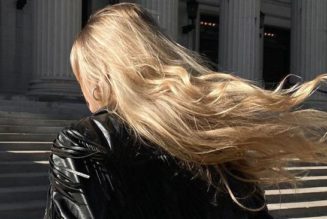
Before we get into things, I think it’s important to get one thing straight—frizz is not a dirty word or anything that you have to fight if you don’t want to. Over the years, I have learned to accept that my hair’s natural texture often means that a dose of frizz is guaranteed when I’m in particular climates (i.e., hot ones), and that’s more than okay. On days I want a sleeker look, I might coax my strands into more of a defined coil, other times I’ll straighten it all out, and other times I leave my hair alone to do entirely its own thing—but it’s all on my terms.
On days that I want to keep frizz at bay, however, one thing is clear: Dry or chemically treated hair (or both in my case) and humidity do not mix well. “Frizz can be caused by humidity as it causes the hair to swell,” explains Michelle Sultan, Imbue creative director. “This is because hair is hygroscopic, which means that the bonds can be broken in the hair structure by absorbing water. If your hair tends to be damaged or dehydrated or you have split ends, then these areas will be more prone to going frizzier faster in high humidity.”











